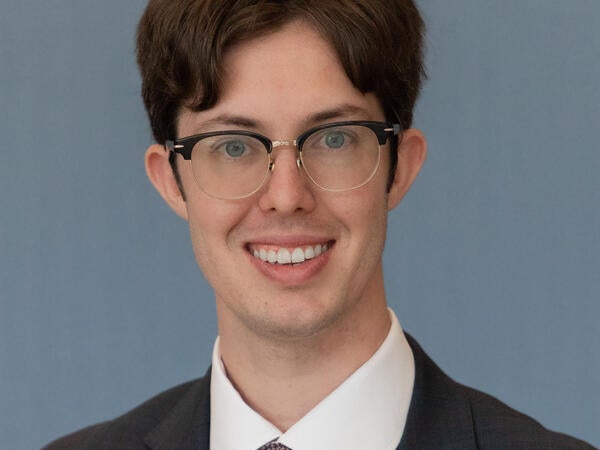
ASU grad aims to use law degree to stand up for others
Editor’s note: This story is part of a series of profiles of notable spring 2025 graduates.
For McKenna Hunter, a third-year JD student at the Sandra Day O’Connor College of Law at Arizona State University, the draw to law began early.
“I loved to learn and solve puzzles, and law was the only profession where there is an intersection of almost every other subject matter, allowing me to learn new things each day in the profession,” he explained.
Once in law school, he knew this was exactly where he wanted to be. It was the path that aligned deeply with a lesson his parents instilled in him: People come first. As a future lawyer, Hunter saw the opportunity to use his abilities to help others navigate life’s most difficult challenges.
That same commitment to service came to life in one of the most memorable lessons he encountered at ASU Law, a story told by Professor Rhett Larson about a ram standing in the road. The ram held its ground as its lambs crossed behind it, even staying when the last one fell. It wasn’t just a story about protection; it was about leadership and standing firm when others need you most.
For Hunter, the image of the ram became a symbol of the kind of lawyer — and person — he strives to be: someone who doesn’t move until everyone is safe and someone who stands firm for those who need protection.
In the future, Hunter hopes to argue a case before the U.S. Supreme Court. After that, he dreams of returning to the classroom as a law professor to pass down what he has learned to the next generation. Like the ram, he plans to stand in the road just long enough to make sure others can cross.
Editor's note: Answers may have been lightly edited for length and/or clarity.
Question: What was your “aha” moment when you realized you wanted to study the field you majored in?
Answer: I had always had a quasi-innate desire to go into law from a younger age, given the intersectionality with issues and the ability to consistently learn new things every day in a unique posture with the profession.
But my “aha” moment that law was where I belonged came during my undergraduate experience, specifically my sophomore year, participating on the undergraduate mock trial team. That year, I devoted substantial time to try to properly understand the rules of evidence and how they intersect with one another to prepare for competition. There was a level of fascination and joy that I had when I had properly understood a rule, the policy for it and how to use it that gave me the realization that going to law school was the right decision for me.
Q: What’s something you learned while at ASU Law — in the classroom or otherwise — that surprised you or changed your perspective?
A: I think what surprised me is how apolitical the courts can be sometimes. Of course, there are common intersections between politics and the courts, but coming into law school, I expected there to be an almost binary decision on complex issues, or at least for that binary viewpoint to come across in a majority vs. dissent opinion.
Rather, what I realized is that judges — and specifically Supreme Court justices — take many different interpretations and thoughts into account in making their determinations. While many certainly have a preference for which modality of interpretation gives more weight, I found it interesting to see how a justice’s interpretation in one sphere, like federalism, can push judges to positions that I wouldn’t think typically comport with their assumed view. That notion has expanded my thought process on issues to look beyond how the unique facts play out, but to also consider a ruling’s effect on federalism, separation of powers, the parties directly, other structural or individual constraints and the underlying policies of each.
Q: Why did you choose ASU?
A: I chose ASU Law because of the community, both internally and externally. I come from a small village with a population of less than 2,000 people, but I have always been more of a city person. Phoenix is a community that mimics the best of both of those worlds — a large city that has access to music, theater and sports, but has an almost small-town feel similar to where I am from. This is especially true for the specialized access to the Phoenix legal community that ASU Law has.
As for the internal community, from the moment I arrived at my first admitted-student event, the students and people from ASU were a demonstration of that feeling; everyone was open-minded, compassionate and took an interest in the people around them. I knew within a single weekend that ASU Law was where I wanted to begin my legal career.
Q: Which professor taught you the most important lesson while at ASU?
A: Professor Larson tells the story of a ram on the last day of every class he teaches, which is an important lesson about leadership and service; I was fortunate to hear it twice and it has always resonated with me. While driving, he came across a ram that walked into the middle of the road. The ram faced his truck head-on and remained there while lambs crossed the road behind him. When the last lamb attempted to cross, it fell, but, rather than leave, the ram remained in the road. Professor Larson analogizes this to strong leaders — a real leader remains on the road until the last lamb is safe.
But more than that, it has always stuck out to me as a story of service as well. As lawyers, we have a unique skill set that allows us to stand up for and protect people from communities who lack the resources and training to assist themselves in the best way. As lawyers, we have a unique call to service to assist, advise and protect those individuals and communities.
Q: What’s the best piece of advice you’d give to those still in school?
A: Never forget why you came to law school. I think it is easy during school to get wrapped up in the stress of assignments, extracurricular activities, networking and everything else that comes with law school. It can feel overwhelming at times. But there is a light at the end of the tunnel, and focusing on that makes the stress easier to manage. Do the work, dedicate the time and make sure to take the opportunity to enjoy law school, the people and the opportunities to learn from experts on copious topics. Before you know it, law school — and all the stress that comes with it — will be over, and I think I will genuinely miss it.
Q: What was your favorite spot on campus, whether for studying, meeting friends or just thinking about life?
A: My favorite spot on campus was the courtroom on the fifth floor (of the Beus Center for Law and Society on the Downtown Phoenix campus). I had the opportunity to participate on the trial team as a noncompetitive member during my first year, and as a competing member during my last two years at ASU Law. Having weekly meetings in the room, I have many fond memories of laughs, smiles and hard work which resulted from spending time with the other competitors and coaches. Through the hard work and practices, I was able to grow close with many of them and develop lasting friendships; the courtroom will always serve as a memory of where some of those close friendships originated.
Q: What are your plans after graduation?
A: After graduation, I will be taking the July bar exam in New York state. I will begin working with Cadwalader, Wickersham & Taft starting in October 2025.
Q: If someone gave you $40 million to solve one problem on our planet, what would you tackle?
A: I would focus the money on filtration and desalination of water. The effect of water on international and domestic issues, including education, hygiene and agriculture (among many others) means that fixing water issues in the world can impact many other world problems. While salinity and water pollution increase, the amount of freshwater that individuals have access to deteriorates, and eventually, there will need to be solutions to those issues. Short-term fixes may be sustainable for the time being, but eventually the world will likely need to find effective ways of desalinating and filtering water for both domestic and global communities.
Q: What’s one of your greatest accomplishments while at ASU Law?
A: I was fortunate to be able to represent Arizona State law school two years in a row in the Jenckes Cup — the annual closing argument competition between Arizona’s two law schools. Both during my first and second year, I had the privilege to work with another law student and the Phoenix law firm Jones, Skelton and Hochuli in developing a two-person closing argument to two real-life cases that were tried before a jury in Arizona. I was able to argue those cases in a closing-argument style to members of the Arizona Trial College, and both years was able to guarantee the trophy remained at ASU.
Written by Crystal Jimenez
For the media
Legal studies research
Legal experts list
Media resources
Faculty directory
Staff directory
For all press and media inquiries, please contact: Kourtney Kelley, Assistant Director of Communications
law.media@asu.edu
480-965-6197
